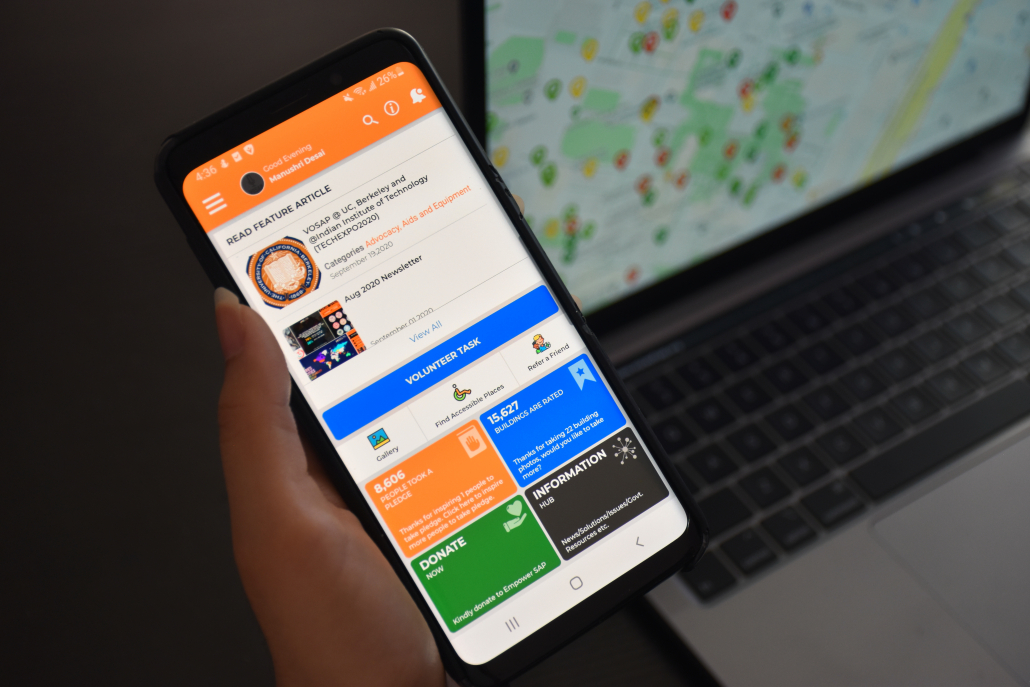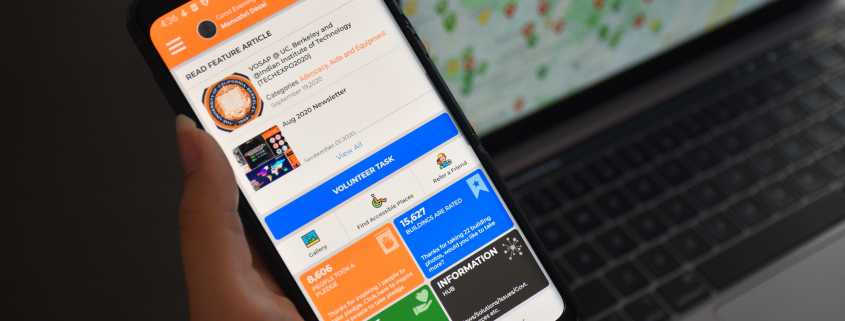Junior-created internships compile research on accessibility

When Anusha Singh and Manushri Desai met during their freshman year at USC, they immediately connected over their shared passion for accessibility and justice.
Singh, a junior majoring in economics and math, had a background in advocacy and volunteer work during her senior year of high school through the creation of her nonprofit Build a Vision, which created tactile materials for children with limited vision. Desai, who is a pre-law student majoring in public policy, contributed research to a now-overturned case in the Supreme Court of India that allowed a student with limited vision to attend medical school.
The summer before Desai began her freshman year, she had visited the Blind People’s Association based in Gujarat, India, where she met with its executive director, who put her in contact with Pranav Desai. He founded the Voice of Specially Abled People, a global advocacy organization that works to increase accessibility for and inclusion of people with disabilities.
VOSAP, which focuses on data-driven advocacy within the government and the general population, is in a “special consultative status” with the United Nations, which grants the organization access to the United Nations Economic and Social Council.
After talking about their shared passion for disability advocacy, Singh and Desai decided to start VOSAP Collegiate in January to bring this disability rights narrative to college students.
VOSAP Collegiate’s first initiative mapped out and rated USC’s accessibility across campus in hopes that other colleges across the nation would follow suit.
As of last spring, Singh and Desai rated 90 building entrances across campus on their accessibility for students with mobility impairments. Their ratings were submitted to the VOSAP mobile app, a crowdsourced database that indicates the accessibility of buildings.
“Once we got to USC, we kind of identified a need for bringing this technology that VOSAP had developed onto our campus,” Desai said. “We saw a need for identifying which places were accessible and inaccessible, and that led us to engage with the USC population to use this technology and hopefully make buildings on our campus a bit more accessible.”
However, their continued efforts on campus were blocked by the switch to remote learning last spring, and VOSAP Collegiate could no longer physically map the rest of campus. Singh and Desai then decided to transition the organization on a more research-based spectrum, and they created a 10-week summer internship program with 28 undergraduate students from USC, UCLA, University of Texas at Austin, Cornell University and Northwestern University.
Students split into 14 teams to research topics such as vaccines and disability, media representation of disability, a disability inclusion index, the legal history surrounding disabilities and public transportation options for disabled people. Interns also had networking opportunities in Zoom breakout rooms to meet one another.
“The goal is to really build a global network of disability rights advocates at universities across the world,” Desai said. “So hopefully we’re able to build the right platform for that and find other changemakers like ourselves that are incredibly passionate about disability rights and disability justice.”
Singh said that once she perceived the far reach VOSAP Collegiate had across the country, she realized how much potential the internship provided.
“These are people across all different walks of life that may work different professional jobs, across different age ranges, but all of them are connected by this one passion and empathy for persons with disabilities, whether these volunteers are able bodied or disabled themselves,” Desai said. “I think that’s the really incredible and unique thing about VOSAP.”
Sarah Schaefer, a sophomore majoring in biomedical engineering, spent the VOSAP internship researching assistive technology for primary and secondary schools. Schaefer said she found it interesting how much assistive technology is integrated into existing technologies, such as apps within cell phones. She also believes to effectively advocate for disability rights, one must have a mindset for realizing the disabled community’s difficulties and be willing to distinguish these barriers.
“The fact that my work is going to help somebody — I mean, my biggest goal in life is to help as many people as possible — just the fact that something good could come out of this,” Schaefer said. “This could be something that I work on in the future.”
Katelyn Lee, another VOSAP Collegiate intern, worked with a student from Cornell over the summer to analyze legal milestones in the disability sector with an emphasis on employment.
“I think the pandemic really put things in perspective. All I ever want to do is help advocate on behalf of people who don’t really have a voice in society because of the barriers we have,” said Lee, a junior majoring in philosophy politics and law who is pursuing a progressive master’s degree in public policy. “I thought it was a really great opportunity to get involved in research, but also do research that would ultimately benefit the persons with disabilities community and help to find ways in which we can eliminate all the barriers that prevent all kinds of persons from being able to really find meaning in their lives.”
During the final week of the internship, each team gave a 15-20 minute presentation to communicate their findings to Singh and Desai based around five general categories, such as disability advocacy in corporations, and presented the professional development research models they worked on throughout the internship.
“I was still interested and shocked to learn about everything that they have come up with, even though I have seen them on a weekly basis, and I knew exactly what they were researching,” Singh said. “To see it all come together was one of the most amazing things.”
In addition to the presentations, VOSAP Collegiate also invited industry professionals ranging from singers and actresses to corporate professionals to listen to the summer research and engage with the interns, Singh said.
For Desai and Singh, the final week of the internship was the most memorable. They said that the presentations were very special and demonstrated their interns’ tangible efforts in their research.
“We were twice as motivated that these 28 people that we had worked with, these interns, would carry on to inspire others,” Desai said. “That’s really kind of this domino effect that we hope to see through those in VOSAP Collegiate — once we inspire one person, they can inspire 10 more people, those 10 people can inspire many more. And so that was really, I think, monumental for both of us to see through the research interns.”
For future projects, Singh said that VOSAP Collegiate hopes to identify individuals who are passionate about disability rights at USC and across different colleges to educate and advocate for accessibility. Desai and Singh also said they look to understand the day-to-day problems that students with disabilities encounter, so they can advocate for change based on those narratives.
“I think the need for accessibility is always evolving, especially for students … to have greater access to education,” Singh said. “Through the years, we want to be able to have established leadership teams across these college campuses to be able to execute this vision.”
Correction: A previous version of this article, misidentified Anusha Singh’s nonprofit as “Bill Division” rather than “Build a Vision.” The article also mislabeled the organization as a USC chapter when it goes by “VOSAP Collegiate” and misquoted a phrase that implied Singh and Manushri Desai created the VOSAP app. The Daily Trojan regrets these errors.
Clarification: Singh and Desai rated “building entrances” not “buildings” as was previously stated.

